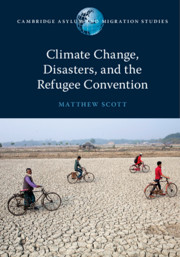Book contents
- Climate Change, Disasters, and the Refugee Convention
- Cambridge Asylum and Migration Studies
- Climate Change, Disasters, and the Refugee Convention
- Copyright page
- Contents
- Figures
- Series Editor’s Preface
- Acknowledgements
- Note on the Text
- Table of Cases
- Table of Treaties and Other International and Regional Instruments
- Abbreviations
- 1 Introduction
- 2 Two Disaster Paradigms
- 3 Jurisprudence on the Determination of Refugee Status in the Context of ‘Natural’ Disasters and Climate Change
- 4 Interpreting the Refugee Definition
- 5 The Temporal Scope of Being Persecuted
- 6 The Personal Scope of Being Persecuted: The Function of the Non-discrimination Norm within the Refugee Definition
- 7 Refugee Status Determination in the Context of ‘Natural’ Disasters and Climate Change
- Appendix: Taxonomy
- Bibliography
- Index
6 - The Personal Scope of Being Persecuted: The Function of the Non-discrimination Norm within the Refugee Definition
Published online by Cambridge University Press: 18 January 2020
- Climate Change, Disasters, and the Refugee Convention
- Cambridge Asylum and Migration Studies
- Climate Change, Disasters, and the Refugee Convention
- Copyright page
- Contents
- Figures
- Series Editor’s Preface
- Acknowledgements
- Note on the Text
- Table of Cases
- Table of Treaties and Other International and Regional Instruments
- Abbreviations
- 1 Introduction
- 2 Two Disaster Paradigms
- 3 Jurisprudence on the Determination of Refugee Status in the Context of ‘Natural’ Disasters and Climate Change
- 4 Interpreting the Refugee Definition
- 5 The Temporal Scope of Being Persecuted
- 6 The Personal Scope of Being Persecuted: The Function of the Non-discrimination Norm within the Refugee Definition
- 7 Refugee Status Determination in the Context of ‘Natural’ Disasters and Climate Change
- Appendix: Taxonomy
- Bibliography
- Index
Summary
In this chapter, the second limitation of the human rights-based approach is examined. The chapter develops the argument that the human rights-based approach casts the personal scope of the refugee definition too widely, as anyone who is exposed to a 'sustained or systemic denial of human rights demonstrative of a failure of state protection' is, by definition, persecuted. Such a definition, however, incorporates a wide range of individuals who would not, having regard to the 'ordinary meaning' of the term, be described as 'persecuted', including people who die because of failures of the state to maintain effective disaster risk reduction infrastructure (as in the case of Budayeva v Russian Federation). The argument is advanced that this dominant definition of being persecuted misses what is fundamental to the experience of being persecuted within the meaning of the Refugee Convention. In this context, being persecuted cannot be understood without reference to the role of discrimination as a contributory cause of a person's exposure to serious denials of human rights. Employing the methodology at Articles 31-33 of the Vienna Convention on the Law of Treaties, a recalibrated definition of being persecuted is articulated.
Keywords
- Type
- Chapter
- Information
- Climate Change, Disasters, and the Refugee Convention , pp. 112 - 131Publisher: Cambridge University PressPrint publication year: 2020

